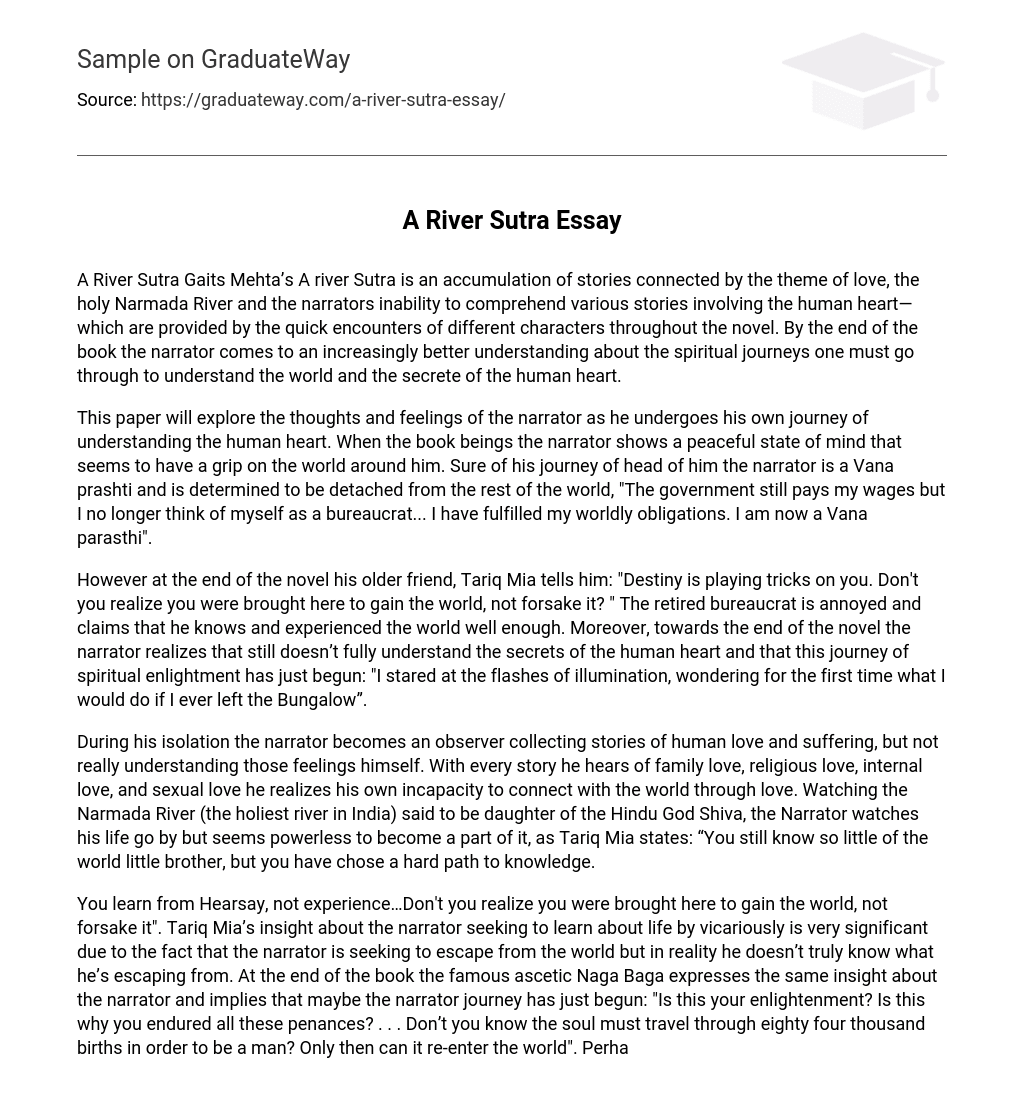A River Sutra by Gaits Mehta is a compilation of interconnected narratives that revolve around love, the sacred Narmada River, and the narrator’s endeavor to fathom diverse tales related to the human heart. These stories are depicted through the experiences of various characters throughout the book. By the end of the novel, the narrator acquires a profound comprehension of the spiritual expeditions required to grasp the world and reveal the mysteries concealed within each individual’s heart.
This paper analyzes the narrator’s thoughts and emotions as he sets out on a personal quest to comprehend the human heart. Initially, in the book, the narrator presents a tranquil mindset and exhibits mastery over his surroundings. He is self-assured about his chosen course and identifies himself as a Vana prashti, resolved to detach from society. He declares, “Even though I still receive my salary from the government, I no longer perceive myself as a bureaucrat… I have fulfilled my worldly duties. Now, I am a Vana parasthi.”
However, towards the end of the novel, Tariq Mia, an older friend of the protagonist, delivers a message: “Destiny is playing tricks on you. Don’t you realize you were brought here to gain the world, not forsake it?” Initially annoyed by this remark, the retired bureaucrat main character asserts his knowledge and familiarity with the world. However, as the story progresses, the narrator admits that he still lacks a complete understanding of the enigmas of human emotions. This realization marks the start of his spiritual journey: “I contemplated moments of epiphany for the first time and wondered how I would navigate life if I ever left behind my current dwelling at Bungalow.”
The narrator, while in isolation, observes and collects stories about human love and suffering, but he himself does not fully comprehend these emotions. Each story he hears about family love, religious love, internal love, and sexual love only highlights his own inability to connect with the world through love. As he watches the Narmada River, considered the holiest river in India and said to be the daughter of the Hindu God Shiva, the narrator witnesses his life passing by, yet feels powerless to engage with it. Tariq Mia remarks that the narrator has chosen a difficult path to gain knowledge about the world while still knowing so little.
The insight of Tariq Mia and the famous ascetic Naga Baga regarding the narrator’s desire to learn about life through others is significant. The narrator wishes to escape from the world, but lacks true understanding of what he is escaping from. Naga Baga suggests that the narrator’s journey has only just begun, questioning if the narrator’s enlightenment and endured penances are sufficient. He emphasizes that the soul must undergo eighty four thousand births before becoming a man and re-entering the world. Perhaps the narrator should learn about life through his own experiences and difficulties. In A River Sutra, the characters cannot comprehend each other. The narrator consistently requires translators to navigate the confusion surrounding the stories that affect his state of being.
The narrator, despite patiently listening to the Jain Monk’s story, fails to comprehend the reasons behind the monk’s decision to renounce the world. The narrator later realizes that he was so engrossed in the intricate details of the ceremony that he overlooked the main point that the Jain monk was attempting to convey. Reflecting on this, the narrator admits, “The fault was mine I suppose. I was so fascinated by his lavish renunciation ceremonies that I never asked him to explain his initial words. Now he has departed without disclosing what it was.” Despite hearing about the monk’s tale of religious love and renunciations, the narrator struggles to fully grasp or connect with the monk’s spiritual mindset.
Instead of focusing on the larger meaning of the monk’s story, the narrator envisions the starvation, challenges, and probable fate that he himself will endure. In this state of darkness, he describes occasionally witnessing the dull glow of something being carried by the Narmada River. He cannot help but wonder if one day, while sitting in the dark, he will see the body of the monk floating below the terrace.
In order to comprehend the tale of the monk, the narrator must seek counsel from his old friend Tariq Mia, an elder mullah. At this juncture, the narrator, who has never discovered the ability to love within himself, struggles to fully grasp the mysteries of the human heart. Throughout the book, readers discover that the narrator’s journey towards spiritual enlightenment will only be fruitful if he comprehends the concept of suffering. The idea of giving up the world becomes perplexing when one knows so little about it and love remains enigmatic. The pursuit of enlightenment may necessitate abandoning worldly ways, but without experiencing life, gaining knowledge from relinquishing it becomes implausible. As the jeep’s doors slam shut and its headlights penetrate the jungle, casting peculiar shadows over bamboo groves, sudden bursts of light traverse the darkness on the twisting path to Rudra. Captivated by these flashes of illumination, the narrator finally looks inward and contemplates his own heart’s secrets for the first time. He ponders what he would do if he were ever to leave the bungalow. Instead of discovering enlightenment in religious teachings, the narrator finds it in the piercing light of the jeep. It is in that moment that the light not only pierces the jungle but also his own heart.Reflecting on the start, the narrator’s lack of comprehension regarding love tales in the book established a sense of curiosity in his own existence. This led him to wonder if he truly comprehends the enigmas of the human heart. Through assistance from others, he eventually grasped the profound significance embedded within each story and the symbolism represented by the sacred Namadra river.





